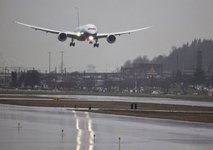Boeing factory move broke labor law: board
 Boeing "violated federal labor law by deciding to transfer a second production line to a non-union facility in South Carolina for discriminatory reasons," the National Labor Relations Board said in a statement.
Boeing "violated federal labor law by deciding to transfer a second production line to a non-union facility in South Carolina for discriminatory reasons," the National Labor Relations Board said in a statement.
The board is seeking an order that would require Boeing to maintain the second 787 production line in Washington state, where the primary assembly plant is located.
It scheduled a June 14 hearing in Seattle for both sides to present their cases.
Boeing said it will "vigorously contest" the complaint.
The case stems from Boeing's decision to open a second production line for the 787, in addition to its unionized plant near Seattle.
Boeing plans to begin 787 production this summer at a new assembly plant under construction in North Charleston, South Carolina.
"Boeing has every right under both federal law and its collective bargaining agreement to build additional US production capacity outside of the Puget Sound region," Boeing's chief counsel, Michael Luttig, said in a statement.
The decision to open the South Carolina production line came after a 58-day strike in 2009 by workers from the International Association of Machinists and Aerospace Workers over contract terms.
The NLRB said its findings supported the union's allegations that the decision was retaliation.
"In repeated statements to employees and the media, company executives cited the unionized employees' past strike activity and the possibility of strikes occurring sometime in the future as the overriding factors in deciding to locate the second line in the non-union facility," the board said.
"A worker's right to strike is a fundamental right guaranteed by the National Labor Relations Act," Lafe Solomon, NLRB acting general counsel, said in the statement.
He acknowledged employers' rights to make business decisions based on their economic interests, "but they must do so within the law.
"I have worked with the parties to encourage settlement in the hope of avoiding costly litigation, and my door remains open to that possibility."
The Machinists union declared the complaint "a victory for all American workers."
The board?s action reinforces the fact that "workers have a right to join a union, and companies don?t have a right to punish them for engaging in legal union activities," said Tom Wroblewski, president of Machinists Union District Lodge 751 in Seattle.
What the stars mean:
★ Poor ★ ★ Promising ★★★ Good ★★★★ Very good ★★★★★ Exceptional
 Tag:
Tag:
Related Contents
Latest News
More News
- State corporations poised to drive 2026 growth (February 03, 2026 | 13:58)
- Why high-tech talent will define Vietnam’s growth (February 02, 2026 | 10:47)
- FMCG resilience amid varying storms (February 02, 2026 | 10:00)
- Customs reforms strengthen business confidence, support trade growth (February 01, 2026 | 08:20)
- Vietnam and US to launch sixth trade negotiation round (January 30, 2026 | 15:19)
- Digital publishing emerges as key growth driver in Vietnam (January 30, 2026 | 10:59)
- EVN signs key contract for Tri An hydropower expansion (January 30, 2026 | 10:57)
- Vietnam to lead trade growth in ASEAN (January 29, 2026 | 15:08)
- Carlsberg Vietnam delivers Lunar New Year support in central region (January 28, 2026 | 17:19)
- TikTok penalised $35,000 in Vietnam for consumer protection violations (January 28, 2026 | 17:15)






















 Mobile Version
Mobile Version